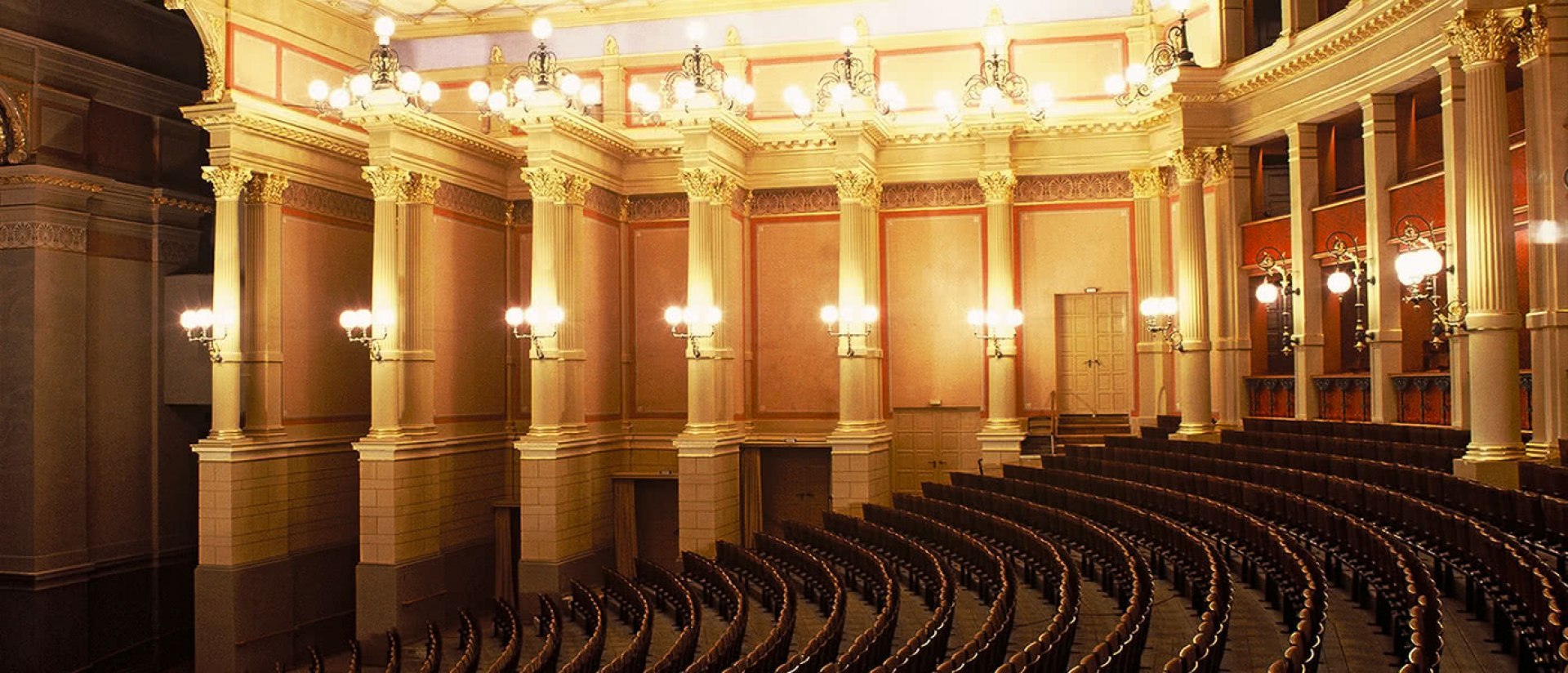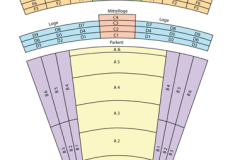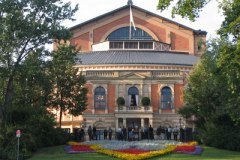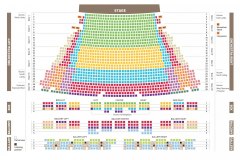Rienzi Bayreuth Festival 2026
Mo | Tu | We | Th | Fr | Sa | Su |
Rienzi
Monumental, political, dramatic.
Rienzi, Wagner’s third opera, was once his greatest success. The story of the Roman tribune of the people intertwines rise and fall, private tragedy and public vision. The original score is considered lost. This rarely performed work emerges as a link between Grand Opera and music drama, with orchestral power and emotional depth. The performance in Bayreuth is a unique opportunity to rediscover Wagner’s early triumph – in a place where it has never been heard before.
Synopsis
Overture
The opera opens with a substantial overture which begins with a trumpet call (which in act 3 we learn is the war call of the Colonna family) and features the melody of Rienzi's prayer at the start of act 5, which became the opera's best-known aria. The overture ends with a military march.
Act 1
Outside Rienzi's house
The patrician Orsini and his cronies attempt to kidnap Rienzi's sister Irene. Stefano Colonna, also a patrician but inclined to support Rienzi, prevents them. Raimondo appeals to the parties in the name of the Church to stop their fighting; Rienzi's eventual appearance (marked by a dramatic key shift, from D to E flat) quells the riot. The Roman people support Rienzi's condemnation of the nobles. Irene and Adriano realise their mutual attraction (duet "Ja, eine Welt voll Leiden" – Yes, a world of sorrows). A gathering crowd of plebeians, inspired by Rienzi's speeches, offers Rienzi the crown; he demurs, insisting that he wishes only to be a Tribune of the Roman people.
Act 2
A hall in the Capitol
The patricians plot the death of Rienzi; Adriano is horrified when he learns of this. Rienzi greets a group of ambassadors for whom an entertainment is laid on (a lengthy ballet). Orsini attempts to stab Rienzi, who however is protected by a vest of chain mail. Adriano pleads with Rienzi for mercy to the nobles, which Rienzi grants.
The act 2 ballet is noteworthy as Wagner made a clear attempt to make it relevant to the action of the opera (whereas in most Grand Operas the ballet was simply an entertaining diversion). The Rienzi ballet was intended to tell the tale of the 'Rape of Lucretia'. This storyline (in which Tarquinius, the last king of Rome, attempts to rape the virtuous Lucretia), parallels both the action of Rienzi (Orsini's attempt on Irene) and its background (patricians versus the people).[24] In its original form the ballet lasts for over half an hour – in modern performances and recordings it is generally drastically cut.
Act 3
The Roman Forum
The patricians have recruited an army to march on Rome. The people are alarmed. Adriano begs Rienzi to stop the war, offering his own life to avoid bloodshed, but is ignored. Rienzi rouses the people and leads them to victory over the nobles, in the course of which Adriano's father Stefano is killed. Adriano swears revenge, but Rienzi dismisses him.
Act 4
Before the Lateran Church
Cecco and other citizens discuss the negotiations of the patricians with the Pope and with the Emperor of Germany. Adriano's intention to kill Rienzi wavers when Rienzi arrives together with Irene. Raimondo now announces that the Pope has laid a papal ban on Rienzi, and that his associates risk excommunication. Despite Adriano's urgings, Irene resolves to stay with Rienzi.
Act 5
Scene 1: A room in the Capitol
Rienzi in his prayer "Allmächt'ger Vater" (Almighty Father!) asserts his faith in the people of Rome. He suggests to Irene that she seek safety with Adriano, but she demurs. An apologetic Adriano enters and tells the pair that the Capitol is to be burnt and they are at risk.
Scene 2: The Capitol is ablaze
Rienzi's attempts to speak are met with stones and insults from the fickle crowd. Adriano, in trying to rescue Rienzi and Irene, is killed with them as the building collapses.
In the original performances, Rienzi's final words are bitter and pessimistic: "May the town be accursed and destroyed! Disintegrate and wither, Rome! Your degenerate people wish it so." However, for the 1847 Berlin performance Wagner substituted a more upbeat rhetoric: "Ever while the seven hills of Rome remain, ever while the eternal city stands, you will see Rienzi's return!".
Program and cast
Production: Magdolna Parditka / Alexandra Szemeredy
Musical direction: Nathalie Stutzmann
Rienzi: Andreas Schager
Irene: Gabriela Scherer
Adriano: Jennifer Holloway
Paolo Orsini: Michael Nagy
Baroncelli: Matthias Stier
Bayreuth Festival
The Bayreuth Festival (German: Bayreuther Festspiele) is a music festival held annually in Bayreuth, Germany, at which performances of operas by the 19th-century German composer Richard Wagner are presented. Wagner himself conceived and promoted the idea of a special festival to showcase his own works, in particular his monumental cycle Der Ring des Nibelungen and Parsifal.
Performances take place in a specially designed theatre, the Bayreuth Festspielhaus. Wagner personally supervised the design and construction of the theatre, which contained many architectural innovations to accommodate the huge orchestras for which Wagner wrote as well as the composer's particular vision about the staging of his works. The Festival has become a pilgrimage destination for Wagner enthusiasts, who often must wait years to obtain tickets.

 EN
EN DE
DE IT
IT FR
FR ES
ES RU
RU JP
JP RO
RO
 Seating plan
Seating plan 
